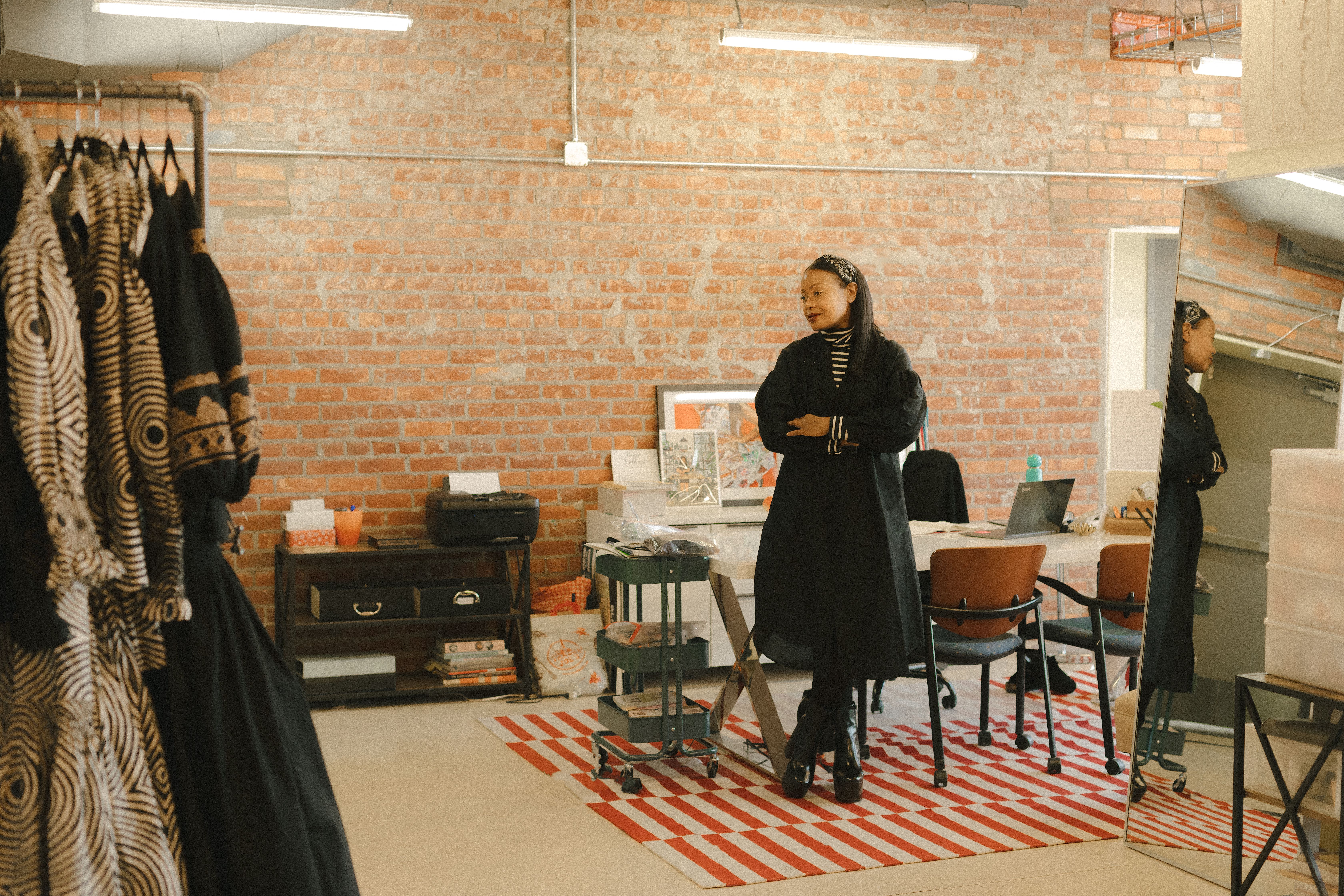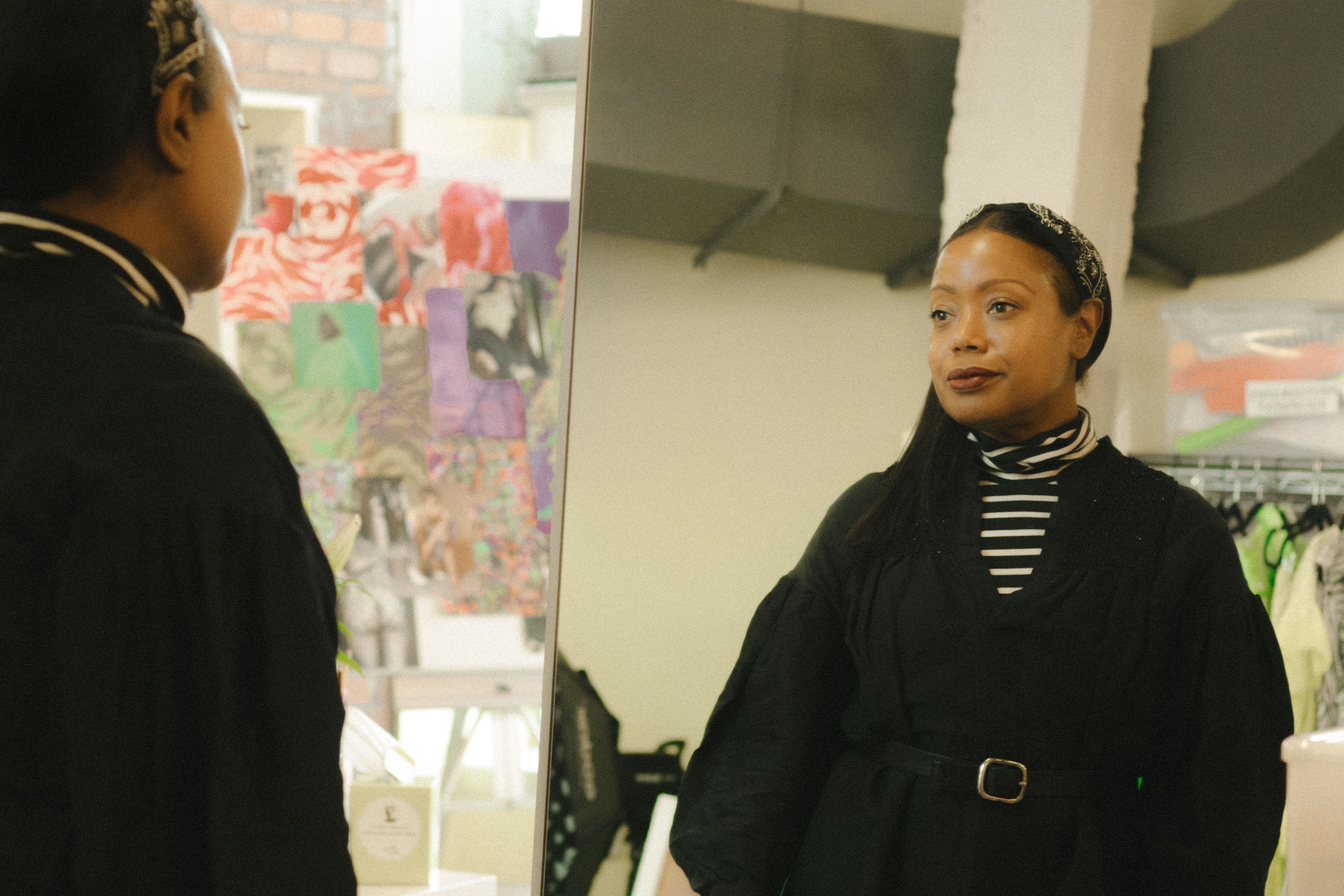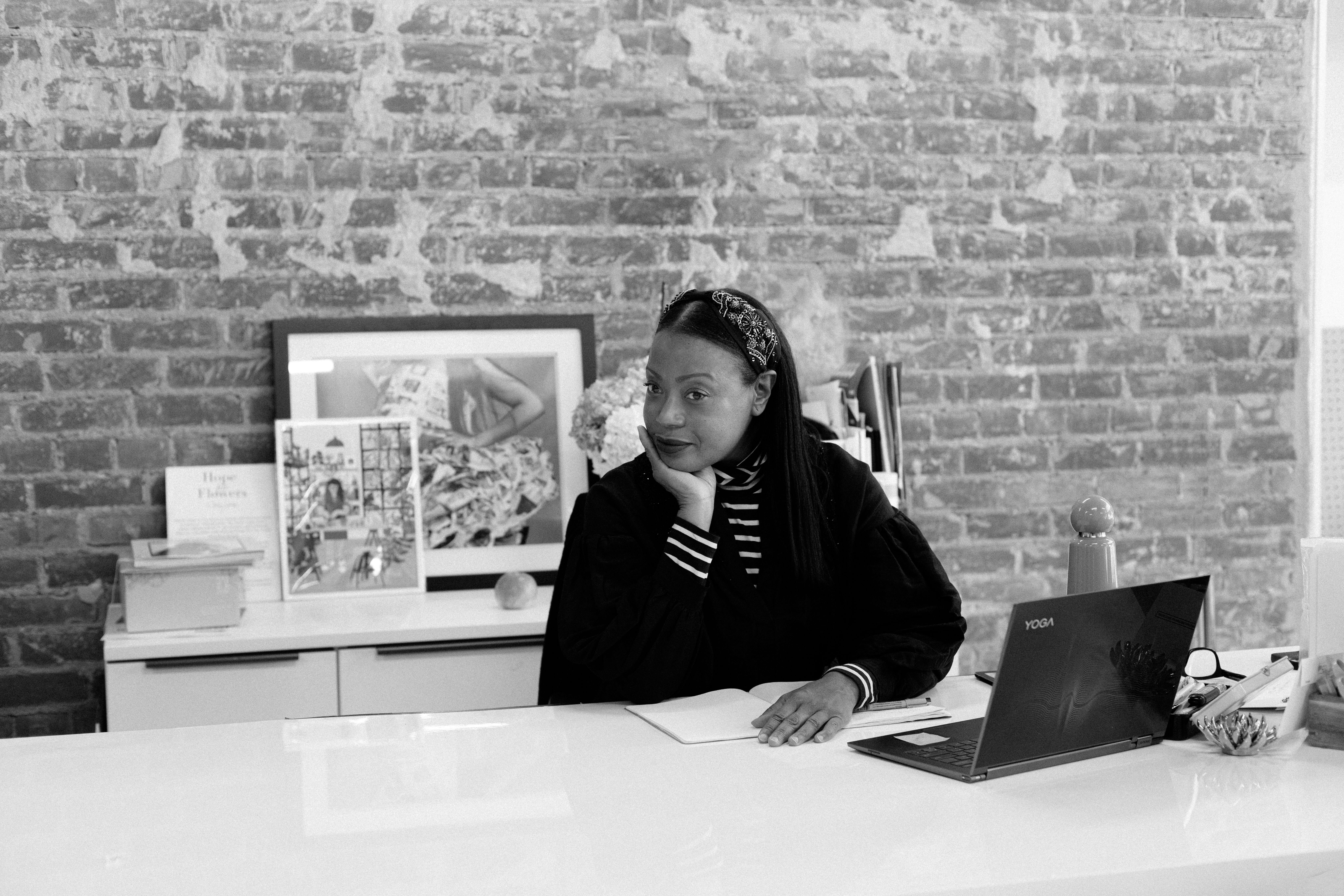Tracy Reese (Tracy): Good question, I didn’t realize that “fashion designer” was a career, per say. When I was younger, my mom and I sewed. I would draw things for us to sew or we would pick out 5 easy pieces from vogue patterns and I would color it up from whatever patterns we had selected.
When I went to Cass Tech here in Detroit, for High School, they had a really strong art department at the time – and I was actually in an AP program which was called Science and Arts. We were allowed to take electives, so I picked the art program. I would take model drawing, figure drawing, and Fashion Design. The head of the Fashion Department, Dr. Cledie Taylor, had said to me that I should consider going to Parsons for College, she thought I had what it took. I didn’t know anything about Parsons, but Cass had a history of sending students to Parsons School of Design in New York.
The summer I was 16 years old, I applied for a 3-month intensive summer program for high school students to learn about the industry. We went to museums, we had model drawing and illustration classes. It was such an eye opener. There I learned that Fashion is big business, that it’s not just a hobby, it’s a huge export of the US and employs millions of people. I thought this was very interesting because I thought I needed to be in a career that was technical or very serious - I was thinking maybe architecture or interior design because I still wanted it to be creative. But I realized that fashion was legitimate, and I decided to go to Parsons for College. Based on my Cass Tech portfolio I got a full scholarship and they also started me at sophomore year instead of freshman year because they told me it would have been redundant (Detroit public school story!)

Eugenie: When did you start your first brand, your eponymous brand Tracy Reese?
Tracy: I started working before I graduated Parsons. After about 3 years, my dad had told me that I should do my own thing. All of my friends that I graduated Parsons with were doing their own thing and had their own collections. I graduated with Marc Jacobs, he was a dear friend, he had launched his own line. So many friends were doing it - It was the late 80s – it was like “just do it!” So I wrote a business plan and my dad financed me and I launched Tracy Reese for the first time, and the rest is history, I guess.
Eugenie: Can you pinpoint where your style outlook comes from?
Tracy: I think a lot of it comes from things that I liked as a child. I have always loved vintage clothing and the detail that goes into really good vintage, like clothing from the 20s-50s.
I have always liked dressmaker details and seeing the work that can be done by hand and really feminine silhouettes. Part of that is my own figure looks best when I am in something that is sort of “fit and flare.” I think some of it comes from the things that I gravitated towards as a home sewer and then just really loving fashion history and all the detail that I found there.
I tend to gravitate towards the work of other women designers because I think there is a real appreciation for the customer and their use of the clothing. It’s not just about what the latest trend is or what is jaw-dropping or incredibly artistic - or even groundbreaking - it’s really about how can this clothing serve a purpose in the customer's life. How can she be flattered by it and want to wear it over and over again? That is always what I am aiming to infuse into my work.
Eugenie: You have had a number of successful fashion brands, what inspired you to start Hope for Flowers?
Tracy: I got to a certain point in my career where I was learning more and more about fashion's footprint in the world between environmental concerns and human rights issues. I just felt like if I was going to continue in the industry, I had to learn how to do it better - I was intelligent enough to do it better.
It’s interesting, I think it's very challenging for a business that has decades of heritage and systems and people in place to change direction. It’s really hard. The industry doesn’t like you to. The stores don’t want you to. They know you for “this” and they don’t like you to step out of your lane. And you have a whole supply chain that you have been working with forever that you have responsibilities to. It is challenging to change. But I knew I had to learn to work differently.
I don’t think the way we used to work was so terrible. I had worked with factories that I had been to myself, and I saw how they functioned and treated their employees. But we sourced our fabrics from all over the world and we used to love to source the most innovative fabrics. I never took into account that some of these textiles would be on the planet for hundreds of years – they are not going anywhere. For example, if you wanted a pleated skirt you have to have a certain polyester content or the pleats won’t set permanently. Certain things we have to let go of, so I won’t be doing any pleated skirts because I am not going to use these polyester textiles. There are choices now, you can use recycled or repurposed materials if you want to do something like that, but I am trying to stay clear of it.
So, my whole sourcing strategy had to change. We are trying to work responsibly, which means working with a much narrower field of textiles. Trying to trace those textiles back to their origin is extremely challenging and makes the list that much shorter. Trying to find suppliers that are in sync with your own vision and mission of your brand is challenging.
It’s easier to start fresh, to be honest, and I needed to also take control of my own destiny.

Eugenie: We receive a lot of questions about sustainability in-store, and we know that the word “sustainability” can take on many different meanings. What does sustainability mean to Hope for Flowers?
Tracy: It's so different for every brand. It has many meanings for us. Sustainability – can we last?
Is this a business that can be maintained for as long as we want it to exist? Are we contributing to the community? Are we thinking larger than ourselves? Are we respecting human rights? Are we sourcing as ethically as we can?
I thought that the biggest change that I could make was in the textiles and yarns. We are using organic cottons, linens, Cupro, and other sustainably forested wood products, like Tencel. Fall is the first time we are using recycled wool and other recycled fibers, as we are trying to fill a seasonal gap.
We are working with a factory I have worked with for over 15 years, and I have visited it multiple times. They are very streamlined and quite vertical as well. Most of what we do with them is done on their own premises – so in terms of concerns with things being subcontracted out, we don’t have that concern. We have a very respectful relationship and I know that they pass all kinds of certifications and compliance, so I have confidence that they are being responsible and a good resource.
We are very community focused, and we want to share what we’re learning about working responsibly with our communities. We launched our enrichment programming in the fall. This is very personal to me. Growing up in Detroit we had art classes on the weekend, my mom wanted to keep us busy, we were all over the city having great experiences. We look at the state of public education here, it’s just not what it was when I was a child, for so many reasons. There is not enough respect for teachers and public education. I wanted to be able to offer something to young people here in Detroit. On Saturdays we have art classes for young people. We are teaching them about sustainable practices along the way, we are teaching about recycling, we are using materials that exist, we’re upcycling things. They are also learning about other artists both local and international that they might not have known about, especially artists of color. So that’s a really fun project.
We also launched our enrichment classes for adults once a week in the evening. Again, upcycle projects. Last fall was a weaving project. Mostly found items. Looms cut from cardboard. People cutting stripes from t-shirts, bringing in old yarn that they had stockpiled at home, bits of broken jewelry that can be woven into the pieces. They made some really amazing projects.
The most beautiful part is the sense of community. People being able to come together and do something creative. The idea of building stronger community bonds by being able to get to know your neighbor is really important.
You can sign up: On our website, there is a tab that says programs. As we launch each new session, we open registration about 3 weeks in advance. Next up is journal making and book binding.

Eugenie: What type of sustainable textiles are you using? Are there any that you are exploring or excited about?
Tracy: There is stuff that I am looking for. It's really challenging to find sheer sustainable textiles, but we found something through an Italian supplier that I am excited to use for Spring of 23. It’s interesting, winter fabrics are a challenge to do anything like the jacquards I used to love to make, that is definitely the most challenging right now because there are only a few suppliers I can work with for something like that, and we’re a small business so we're not trying to take on any large minimum responsibilities.
One of the things we are looking forward to is developing our own craft right here in Detroit and training local artisans to execute on some of these items. For fall we are crocheting a giant t-shirt out of old t-shirts that I got at goodwill because with the whole weaving project, we can do something more with these stripes of vintage t-shirts.
We’ve also worked with a local artisan dyer here, Najma Ma’at Wilson and she’s done some Shibori work for us. We got in organic cotton mesh from Japan and she Shibori dyed some t-shirts for us for Spring and we’re continuing with some of those ideas for Fall. We’ve also collaborated with Shayla Johnson from Scarlett Crane on local printing projects that we will also be continuing. We wanted to build a local footprint and a local signature for what we can do right here in Detroit.
Eugenie: If you had to choose a particular garment in your assortment (past or present!) that reflects the Hope for Flowers brand ethos, which would it be?
Tracy: That’s hard, I feel like we are still getting there, Hope for Flowers is only 2 years old! Each season we make great leaps in terms of the product itself. It’s desirable, it’s sustainable, I think it’s something that is yet to come. I wouldn’t want to have arrived at that quite yet. It’s the journey.
Eugenie: Does anyone inspire your designs - artist, designer, or anyone else?
Tracy: It's a constant thing. There are a lot of artists that I really admire like Simone Lee - or we’re totally into Velma Rosai at the moment. There are so many incredible artists, I am inspired by their look, their vision, or their work itself. Luckily art is always there to inspire us. Being able to go to museums and galleries is always enriching and deeply inspiring and I’m glad we can travel and see things in other cities as well as all the offerings right here in Detroit.
Eugenie: Looking forward, where do you hope to see the brand go? Where do you hope to see the fashion industry go?
Tracy: I really want to expand our distribution to some of the great boutiques in the US and beyond. I want to get to a size where we have security, but I don’t want to overproduce and get too big. That's not the brand of the future. I think that things that are a little less available and a little more exclusive are much more attractive. I want to figure out packaging and make sure that we are packaging our products more sustainably. I want to tackle more the components of the garments like buttons - okay really having a nice supply chain for sustainable button materials and the fastenings and all that! I really want to develop our made in Detroit voice, so that is the future for the brand.
For the industry, it’s baby steps. We have to see if the Fashion Act passes in NY. There is currently no legislation, there is no governmental oversight of how our industry operates. That’s why fast fashion has proliferated, that’s why human rights abuses have proliferated, and abuses of the waterways the list goes on and on. There must be regulation and there has to be legislation and I think that the next generation of designers, the kids that are in design schools now, they're passionate about this stuff and it's going to take this generation to change how this industry functions.
Eugenie: You moved back to your hometown of Detroit in 2019, and now spend your time between Detroit and New York - can you talk a little bit about why you chose to grow Hope for Flowers here in Detroit?
Tracy: I saw an opportunity here. As a native Detroiter and someone who is coming home a lot, I wanted to have property here, and that's how it all started. I wanted to buy a house and I was like, if I have a house here, I want to be able to live in that house. As my life was shifting in NY, everything started to fall into place and make sense, and I realized there is no reason I can’t do this in Detroit. I can start another business in New York, it’s a dime a dozen. I can go to NY for whatever I need if I can't find it Detroit. why not start here and build a team here, a team of Detroiters, and train people with the skills they need to help me facilitate this business and also embark on these other ideas I had like, the art enrichment program and community workshops and working with artisans here in Detroit. It makes it all brand new for me which is really exciting.
Eugenie: As a successful female founder, what key pieces of advice do you have for other aspiring female fashion entrepreneurs?
Tracy: I think really not forgetting the customer. A lot of us creatives just want to create sometimes, and you lose sight of why you're creating. So, it depends if you want to have a commercial business or if you want to have an artistic endeavor, or if you want people to be able to buy and wear your clothes, then you do have to consider the needs of the customer. That's advice I always give to up and coming designers.
For women in this industry especially I would say, don’t let the fact that your sex, your race, anything can hold you back from your dreams. Educate yourself, surround yourself with people who are like-minded, that keep you motivated, and who can help you out when you're in a jam. Keep striving, because you can be anything you want to be if you put the effort in, and if you give yourself the opportunity to learn and master your craft. I think in this day and age a lot of people want that golden ticket, they want to arrive…and it’s so much more about the journey.
Eugenie: We love having your collection alongside our sustainable brands at Eugenie! What would be your top favorite pieces or brands from our assortment?
Tracy: I brought sweaters at Eugenie, and I always love the knitwear and a lot of the accessories too. I’m really attracted to the jewelry and sometimes I have to stop myself!
I just like the whole mood of the store, I love all the discoveries, and I love the mixture of whimsical and sturdy, like built to last. Each time I go in I discover something new and something fun and something that makes me smile and something that is beautifully crafted that I want to support. I highly recommend it as an experience.